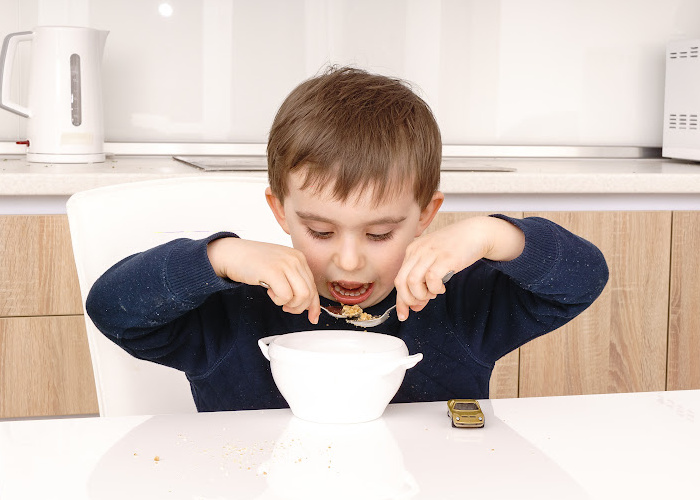It's crucial to know that students with autism and ADHD need special study strategies. Autism…

Is Humming When Eating a Sign of Autism?
Humming or making noises while eating is a common behavior in children. For some parents, it may raise concerns about autism spectrum disorder (ASD).
In this blog post, we’ll explore the reasons behind mealtime humming and whether it could be an early sign of autism.
What is Autism Spectrum Disorder?
Autism spectrum disorder (ASD) is a developmental disability characterized by challenges with communication, social interactions, and restricted or repetitive behaviors. It is called a “spectrum” disorder because symptoms and severity can vary widely between individuals. There is no one specific test for ASD—it requires comprehensive screening and evaluation.
How Might Humming During Meals Relate to Autism?
There are several ways that humming or vocalizing repeatedly while eating could potentially signal autism:
- It may provide comfort and sensory stimulation
- It could fill in for underdeveloped verbal skills
- The habit may stem from repetitive tendencies
- It might express happiness or enjoyment
- Humming helps self-regulate during overwhelming sensory experiences
So in some cases, yes—persistent humming can be an early red flag for ASD, especially if other developmental delays are present. However, there are also many benign explanations.
When Should This Behavior Raise Concerns?
Parents should pay close attention if mealtime humming persists past early childhood and occurs alongside issues like:
- Delayed speech development
- Minimal interest in social interactions
- Difficulty adapting to changes in routine
- Limited eye contact
- Sensitivity to certain sounds, tastes, or textures
Consulting a pediatrician is wise whenever developmental delays are suspected. Early intervention improves outcomes.
What Else Could Cause Humming While Eating?
While autism is one possibility, humming during meals could also be:
- A self-soothing habit
- An expression of happiness
- Mimicking others’ sounds
- Anxiety relief
- Cultural custom
- General developmental lag
Supporting a Child Who Humms During Meals
If a child habitually hums or vocalizes while eating, parents can:
- Remain patient and observant
- Notice triggers and adjust the environment
- Incorporate music and humming into play
- Have the child evaluated for any needed support
- Focus on creating a calm, positive mealtime
Conclusion
Frequent humming or noisemaking during eating may raise autism concerns but could also be harmless. Comprehensive screening is the best way to determine if ASD is the cause. With support tailored to the child’s needs, this behavior often diminishes over time. Early intervention provides the best outlook.

Frequently Asked Questions
Here are some frequently asked questions about humming or vocalizing during meals and what it might indicate about autism spectrum disorder (ASD).
Is humming or making noises while eating automatically a sign of autism?
No, humming while eating does not definitively mean someone has ASD. While it can sometimes be an early symptom, there are also many other harmless explanations like general enjoyment, self-soothing, habit, mimicking others, cultural custom, anxiety relief, or unrelated developmental lags. Evaluation for ASD involves comprehensive screening.
At what age does humming while eating become a potential red flag for autism?
Frequent humming or noisemaking during meals is common in toddlers and young kids up to ages 3 or 4. It becomes a potential concern if it continues persistently past early childhood, especially alongside other possible indicators of ASD like delayed speech, disinterest in social interactions, adverse reactions to routine changes, limited eye contact, and sensory sensitivities.
Why might a child with autism hum or make noises while eating?
Humming may provide comfort, sensory input, happiness, or a way to self-regulate during overwhelming environmental stimuli at mealtimes. It could also fill gaps for children with underdeveloped verbal skills and be part of repetitive tendencies. Each child is unique.
What other developmental issues can cause a child to hum during meals?
Besides autism spectrum disorder, habitual humming or vocalizing while eating can also stem from general developmental lags, speech delays, anxiety, self-soothing tendencies, mimicking others’ sounds, cultural norms, or a soothing habit. Evaluation is needed to pinpoint causes.
How can I support my child who hums or makes noises when eating?
Respond calmly without forcing them to stop, take note of triggers, incorporate music/humming into playtime, have them evaluated for developmental needs, focus on creating a positive mealtime environment, and be patient. Consult occupational therapists as well. The behavior often fades.
Is humming while eating more common in boys or girls with autism?
There is no definitive evidence that mealtime humming is more gender-specific. ASD occurs more often in boys but symptoms can manifest similarly in boys and girls. Every child is unique regardless of gender. Careful screening is important for any persistent humming.
Could humming while eating be a sign of other developmental disorders besides autism?
Yes, habitual humming or noisemaking might indicate delays unrelated to ASD like speech impediments, anxiety disorders, obsessive-compulsive disorder, attention deficit hyperactivity disorder, or sensory processing issues. Child psychologists can help determine causes.
Is it safe to try and discourage humming during meals?
It’s generally best not to discourage mealtime humming unless it’s disruptive. This repetitive behavior likely provides comfort and sensory stimulation that helps the child self-regulate. Gently reinforcing more speech may help broaden communication over time.
How can I explain my child’s humming while eating to family and friends?
Calmly share that it may be soothing sensory input or help self-regulation during overwhelming mealtime environments. Note that you’re having your child evaluated and that the behavior often naturally diminishes with age and support. Politely ask others not to draw attention to it.
When should I take my child to see a doctor about humming or vocalizing during meals?
Consult your pediatrician whenever developmental concerns arise, like if humming persists past early childhood along with issues like speech delays, sensory sensitivity, lack of eye contact, or disinterest in social interaction. The earlier autism screening happens, the better the outlook with early intervention.



This Post Has 0 Comments